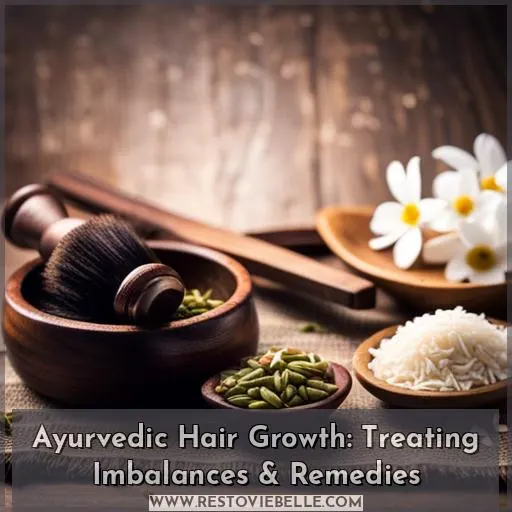This site is supported by our readers. We may earn a commission, at no cost to you, if you purchase through links.

With Ayurvedic hair growth remedies, you can treat imbalances in your doshas and unlock the potential for healthy, thriving locks.
Discover the power of Ayurveda to nurture your hair from within, addressing underlying causes of hair fall while promoting natural rejuvenation.
Say goodbye to dullness and embrace a holistic approach to enhance your mane’s strength and beauty with Ayurvedic wisdom.
Experience the transformative effects as you embark on this journey towards vibrant tresses.
Table Of Contents
- Key Takeaways
- Ayurvedic Dosha Assessment
- Understanding Hair Fall and Imbalances
- Ayurvedic Treatment Approaches
- Personal Experience With Ayurvedic Hair Growth Treatment
- Frequently Asked Questions (FAQs)
- Are there any specific herbs or ingredients in Ayurvedic hair growth products that are known to promote hair growth?
- Can Ayurvedic hair care routines be effective for all hair types, including curly or textured hair?
- How long does it typically take to see noticeable results from Ayurvedic hair growth treatments?
- Are there any potential side effects or risks associated with using Ayurvedic hair growth products or treatments?
- Can Ayurvedic hair growth treatments be used in conjunction with other hair care products or treatments?
- Conclusion
Key Takeaways
- Ayurvedic hair growth treatments are based on the idea that imbalances in the body’s doshas can lead to hair loss.
- Vata, Pitta, and Kapha hair qualities are used to assess the individual’s dosha and determine the best course of treatment.
- Panchakarma is a cleansing treatment that can help to remove toxins from the body and improve hair health.
- Ayurvedic hair growth remedies can help to nourish the hair and scalp, promote hair growth, and prevent hair loss.
Ayurvedic Dosha Assessment
Now let’s delve into the topic of Ayurvedic Dosha Assessment.
In Ayurveda, doshas are categorized as Vata, Pitta, and Kapha – each influencing hair growth based on their unique qualities.
Understanding your dominant dosha can provide insights into your hair’s specific needs and help tailor a personalized approach to promote optimum health and vitality.
Let’s explore the characteristics of Vata, Pitta, and Kapha hair to better understand how imbalances in these doshas can manifest in various hair issues such as dryness or oiliness.
Vata Hair Qualities
Identifying vata hair qualities is crucial for understanding the dosha’s influence on hair health and growth. Vata, characterized by higher air and ether elements, manifests in specific characteristics that require specialized care.
To address vata imbalances and promote holistic hair wellness, consider incorporating these practices:
- Ayurvedic Oiling Techniques: Regular scalp massages with nourishing oils like almond or sesame can hydrate dry strands and soothe a flaky scalp.
- Specific Products: Look for ayurvedic products formulated to balance vata dosha, such as shampoos infused with herbs like bhringraj or brahmi.
- Ayurvedic Lifestyle: Adopting a lifestyle aligned with ayurveda principles can support overall well-being, including maintaining healthy sleep patterns, reducing stress levels through meditation or yoga practice.
Pitta Hair Qualities
Do you know what qualities characterize Pitta hair according to Ayurvedic dosha assessment?
Pitta hair is typically straight and silky, with moderate resistance. However, when there’s an imbalance in the Pitta dosha, it can lead to issues such as oiliness, inflammation of the scalp, and excessive heat.
To restore balance and promote healthy hair growth for individuals with a dominant Pitta constitution or imbalanced Pitta dosha, Ayurvedic lifestyle practices like emotional well-being techniques and dietary influences can be combined with herbal infusions and environmental balance for effective treatment.
Kapha Hair Qualities
To assess your Kapha hair qualities and determine any imbalances, you can observe certain characteristics such as thickness, oiliness, and density.
- Oily Scalp: Kapha-dominant individuals tend to have an oily scalp due to the earth and water dominance in their dosha composition.
- Dense Hair Follicles: The abundance of dense hair follicles is a common trait among those with Kapha-type hair.
- Thick, Curly Hair: Individuals with Kapha-type hair often have thick strands that tend to be curly or wavy in texture.
- Prone to Dandruff: Due to excess oil production on the scalp, those with Kapha-type hair may be more prone to dandruff.
Understanding these unique characteristics can help guide you towards appropriate Ayurvedic remedies for maintaining healthy scalp and promoting optimal growth for your specific needs.
Understanding Hair Fall and Imbalances
Hair fall can be a common concern for many individuals, and understanding its causes is essential in addressing the issue holistically.
Factors such as hormonal imbalances, nutritional deficiencies, and excessive stress can contribute to hair fall.
Stress, in particular, plays a significant role by disrupting the natural growth cycle of hair follicles and leading to increased shedding.
By identifying these underlying imbalances and adopting holistic approaches like Ayurveda that focus on restoring overall well-being, you can effectively manage hair fall and promote healthy regrowth.
Causes of Hair Fall
To understand the causes of hair fall, it’s important to recognize the factors that contribute to imbalances in the scalp and hair.
Understanding follicles, lifestyle impact, nutrient balance, hormonal influences, and scalp health are crucial in addressing this issue.
Ayurvedic practitioners emphasize natural remedies such as herbal hair tonics like Indulekha for promoting overall hair health.
By focusing on these aspects holistically, you can take steps towards preventing and treating hair fall effectively.
Impact of Stress on Hair Fall
Stress plays a significant role in contributing to hair fall, further exacerbating the imbalances and issues related to hair loss. The psychological impact of stress on hair health is undeniable, as the mind-body connection influences our overall well-being.
Understanding resilience and coping mechanisms are essential for effective stress management. Holistic approaches like practicing mindfulness, engaging in relaxation techniques, using herbal supplements, and incorporating Ayurvedic practices can promote emotional well-being and scalp health while addressing hair loss concerns holistically.
Ayurvedic Treatment Approaches
When it comes to treating imbalances in hair doshas, Ayurveda offers a holistic approach that focuses on restoring balance and promoting healthy hair growth.
One of the key treatment approaches is Panchakarma, which involves detoxification and rejuvenation therapies to cleanse the body and remove toxins that may be contributing to hair issues.
Additionally, Ayurvedic remedies such as herbal oils, shampoos, conditioners, and supplements can provide nourishment and support for optimal hair health.
By addressing imbalances through these treatment approaches, you can effectively promote natural hair growth while maintaining overall well-being.
Treating Imbalances in Hair Doshas
Applying Ayurvedic principles involves treating imbalances in hair doshas for optimized hair growth.
Ayurvedic treatment approaches often include:
- Dosha balancing foods
- Herbal hair masks
- Specialized scalp massage techniques
- Some lifestyle adjustments
Hair care routines should be adapted to the changing seasons for continued balance.
Products like Just Herbs help restore equilibrium gently through traditional formulas.
With a holistic outlook, Ayurveda provides natural solutions for hair growth.
Panchakarma for Hair Growth
After addressing imbalances in hair doshas, you’ll want to try panchakarma treatments to stimulate hair growth.
Panchakarma is an Ayurvedic treatment approach that offers a holistic healing experience for your scalp and hair. It involves various techniques such as herbal infusions, scalp rejuvenation, and the use of dosha-specific oils.
These treatments not only promote healthy hair growth but also contribute to overall well-being by restoring balance in the body and mind.
Experience the benefits of panchakarma for yourself with Shaz & Kiks’ specialized Ayurvedic therapies.
Ayurvedic Hair Growth Remedies
During your Ayurvedic treatment for hair growth, you’ll use remedies like herbal oils, masks, supplements, and lifestyle changes tailored to your dominant dosha.
- Herbal infusions like amla and brahmi to nourish hair follicles
- Daily scalp massage with warm, medicated oil to stimulate growth
- Balancing nutrition through dosha-specific diet and herbs
- Optimizing lifestyle factors for harmony and reduced stress
- Adapting hair care practices to changing seasons
Personal Experience With Ayurvedic Hair Growth Treatment
Let’s now dive into the personal experience of individuals who’ve undergone Ayurvedic hair growth treatment. They’ll share their journey with Ayurveda, from assessing their dosha to receiving personalized treatments and trying other Ayurvedic remedies for hair health.
Through their stories, you’ll gain insights into the effectiveness of these holistic approaches and discover the results they achieved in terms of hair regrowth and overall satisfaction with this ancient healing system.
A Brief History of Ayurveda
While delving into Ayurvedic hair growth treatments, your journey begins by understanding the historical roots of Ayurveda and how it intersects with your personal experience in addressing hair imbalances.
Ayurveda, originating from ancient India, embodies holistic healing practices, aligning with your quest for mastery in restoring hair balance. Embracing its origins infuses your path toward liberation from hair issues, empowering your journey to reclaim hair health.
Assessing My Dosha
In the journey of exploring Ayurvedic hair growth and addressing imbalances, understanding your predominant dosha becomes pivotal.
Assessing your dosha involves recognizing inherent traits affecting hair health.
Vata, Pitta, or Kapha dominance impacts your hair quality, guiding personalized Ayurvedic haircare.
Herbal remedies and treatment results are tailored to rebalance your dosha, fostering optimal hair health aligned with your unique constitution.
My Treatment
Experiencing a tailored Ayurvedic treatment was pivotal in addressing your hair concerns and reshaping your journey toward hair regrowth. The journey involved insightful Ayurvedic practices aimed at restoring dosha balance and fostering holistic wellness.
- Dosha Assessment: Thorough examination identified dosha imbalances influencing hair health.
- Holistic Approach: The treatment embraced a holistic lifestyle shift for sustained results.
- Challenges Overcome: Overcoming initial treatment challenges strengthened the commitment to Ayurveda.
- Transformational Results: Witnessing transformational results underscored the efficacy of Ayurvedic insights in hair care.
Other Ayurvedic Remedies
Explore additional Ayurvedic remedies that played a pivotal role in your personal journey toward restoring hair health and addressing imbalances in your doshas.
Some of these remedies include:
- Bhringraj oil for promoting hair growth
- Shikakai powder to combat hair fall
- Amla powder for preventing hair loss
- Aloe vera for maintaining scalp health
- Neem oil to address dandruff issues
These natural ingredients have been used traditionally in Ayurveda to nourish the scalp and promote healthy hair growth.
My Results
After 6 months of Ayurvedic hair growth treatment, I noticed a significant decrease in hair fall and an increase in hair growth.
My results:
- Hair regrowth after 6 weeks
- No recurrence after 12 months
- Satisfied with visible improvement
- Ayurvedic products played a key role
- Stable hair health, even after returning to a different environment
Frequently Asked Questions (FAQs)
Are there any specific herbs or ingredients in Ayurvedic hair growth products that are known to promote hair growth?
To promote hair growth, Ayurvedic hair growth products often contain herbs like:
- Bhringraj
- Amla
- Shikakai
- Methi Dana
These ingredients have been traditionally used for their nourishing and strengthening properties to support healthy hair growth.
Can Ayurvedic hair care routines be effective for all hair types, including curly or textured hair?
Ayurvedic hair care routines can work wonders for all hair types, including curly or textured hair. The ancient secrets of Ayurveda unleash the power of natural ingredients to nourish and strengthen your locks, giving you luscious and healthy tresses.
How long does it typically take to see noticeable results from Ayurvedic hair growth treatments?
Results from Ayurvedic hair growth treatments vary, but noticeable improvements can typically be seen within a few weeks to a couple of months.
Consistency and patience are key as the natural ingredients work to nourish and strengthen your hair follicles.
Are there any potential side effects or risks associated with using Ayurvedic hair growth products or treatments?
When using Ayurvedic hair growth products or treatments, it’s important to prioritize safety.
While side effects are rare, potential risks can include:
- Allergic reactions
- Skin irritation
Consult with a qualified practitioner for personalized guidance and minimize any possible risks.
Can Ayurvedic hair growth treatments be used in conjunction with other hair care products or treatments?
Yes, Ayurvedic hair growth treatments can be used in conjunction with other hair care products or treatments. However, it’s important to consult with a healthcare professional to ensure that all of the products are compatible and that there are no potential side effects.
Conclusion
If you’re looking for a natural and holistic approach to hair growth, Ayurveda can help. Ayurvedic hair growth remedies can treat imbalances in your doshas and promote healthy, thriving locks.










